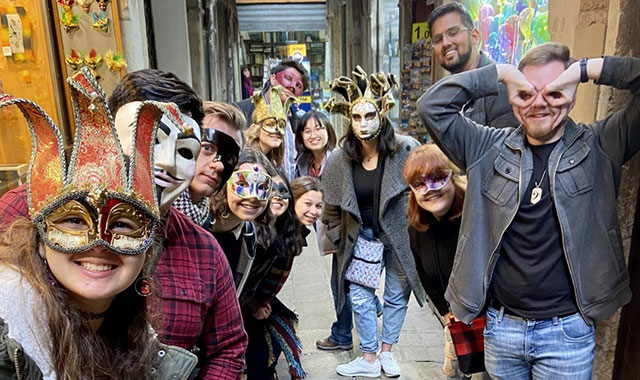Anthropology
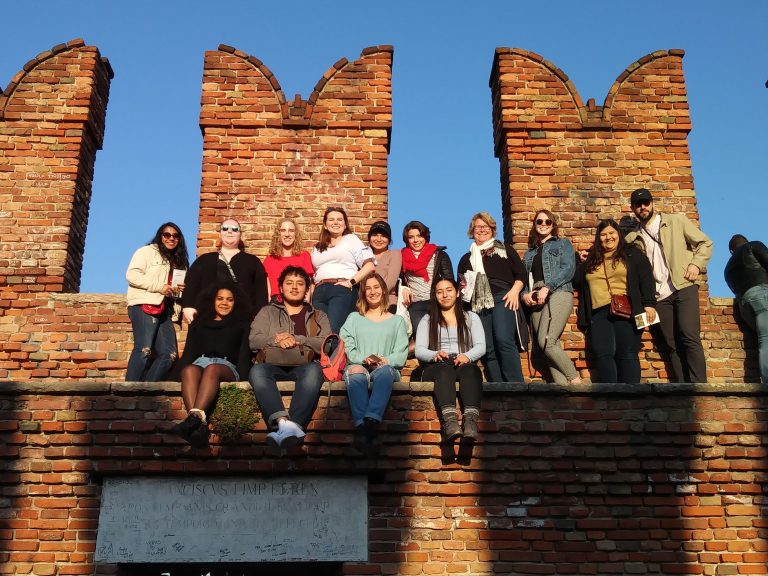 Unlike many study abroad programs, which involve registrations at foreign institutions and administrative hurdles to transfer courses, the COLFA Semester in Urbino offers UTSA courses taught by UTSA faculty or by University of Urbino faculty who have been vetted and approved by UTSA. The courses have been carefully selected to fit into UTSA degree plans and will appear seamlessly in ASAP. Moreover, since you will remain a full-time UTSA student during your semester abroad you will have access to UTSA services such as financial aid and library resources and will not encounter difficulties with minimum credit-hour requirements for financial aid or scholarships.
Unlike many study abroad programs, which involve registrations at foreign institutions and administrative hurdles to transfer courses, the COLFA Semester in Urbino offers UTSA courses taught by UTSA faculty or by University of Urbino faculty who have been vetted and approved by UTSA. The courses have been carefully selected to fit into UTSA degree plans and will appear seamlessly in ASAP. Moreover, since you will remain a full-time UTSA student during your semester abroad you will have access to UTSA services such as financial aid and library resources and will not encounter difficulties with minimum credit-hour requirements for financial aid or scholarships.
Supplemental art and cooking classes are also available during the semester.
Important Dates for Fall 2024
See some of the important events and trips scheduled for the semester. Many of the details are still being finalized, so some dates and trip destinations may vary. A printable schedule of class meeting times and excursion dates is also available.
| February 28 | Commitment fee of $1000 due by 4:00 pm (see the Fall 2024 Canvas Organization for payment instructions) |
|---|---|
| March 30 | Balance of first payment of $1750 due by 4:00 pm |
| August 30 | Arrival in Rome at Leonardo da Vinci International Airport (FCO) no later than 1:00 pm; charter bus to Urbino departs promptly from the airport at 2:00. Anticipated arrival in Urbino at 6:30 pm. |
| August 31 | 9:00: GEV orientation. GEV will collect a deposit (€100 or $100) that will be returned at the end of the program if there are no damages to the classrooms or dorms. 13:00: welcome lunch 14:00 tour of Urbino with Roberta |
| September 2 | classes begin |
| September 5 | 9:00: Organic Farm Tour 13:00: Welcome Lunch |
| September 6 | 9:00 Departure by public bus for guided tour of Pesaro |
| September 7 | 9:00 Historical Tour of Urbino 11:00 Palazzo Ducale Tour |
| September 12 | 8:00 Departure for day trip to Bologna |
| September 20-22 | Extended excursion: Rome |
| September 26 | 7:30 Departure for day trip to Ravenna |
| October 4-6 | Extended excursion: Venice |
| October 7-13 | Fall break |
| October 17 | 8:00 Departure for day trip to Rimini |
| October 24-27 | Extended excurtion: Siena and Florence |
| October 31 | 8:00 Departure for day trip Assisi/Perugia (the UTSA group will be split with one group going to Perugia and another group going to Assisi. The groups will visit the alternate cities on November 7) |
| November 7 | 8:00 Departure for day trip to Perugia/Assisi |
| November 14-16 | Optional Mini-Excursion to Matera |
| November 20 | Final exams and presentations |
| November 21 | Farewell Dinner |
| November 25-26 | Studio cleaning and check-out Dorm check-out |
| November 27 | 5:00 Bus to Rome Airport for return to US. All students must fly home on this day |
Course Information
The following 16 credit hours of courses are offered during the Fall 2024 semester.
The focus on Anthropology will be especially relevant to students in the Medical Humanities, History, History, Museum Studies, and Psychology programs. Graduate versions of these courses are also available. If you are a graduate student interested in the COLFA Semester in Urbino, please contact us for more information.
| ANT 4853-25752 | Anthropology Across the Atlantic |
|---|---|
| ANT 3863-25747 | The Evolution of Human Nature |
| ANT 3873-25748 | Food, Culture, and Society |
| HIS 4953-26326 | Italian History and Culture |
| FL 1034 | Elementary Italian (do not enroll: course will transfer) |
Course Descriptions
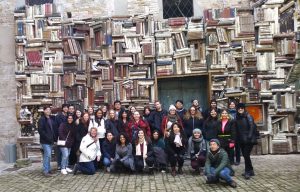
ANT 3873 Food, Drink, and Evolution. Some people can’t drink milk, some hate cilantro and others have allergic reactions to shellfish or peanuts. Many of our tastes in different foods and the diversity in local cuisines around the world are the outcome of complex interactions between biology and culture. Consider the evolutionary origins of your meals, whether it's breakfast, lunch, or dinner, and you'll recognize that our food and drinks have a deep-rooted evolutionary past. In this class we will explore human taste and the evolutionary foundations of our diets, ranging from spices to alcoholic beverages that have been pivotal for thousands of years.
ANT 3863 Becoming Human. Humans are unusual animals. Our special anatomy, intellectual abilities and technology have allowed us to dramatically change our planet and even explore space. But what makes humans unique? Many traits are often thought to be uniquely humans – language, bipedal locomotion, tool-making, intelligence; however, scientists struggle to clearly identify what separates humans from other animal species. This class is a journey in the uniqueness of our own species under a biological and anthropological lens. By understanding our past, we will explore who we are today and what the future might hold for humanity.
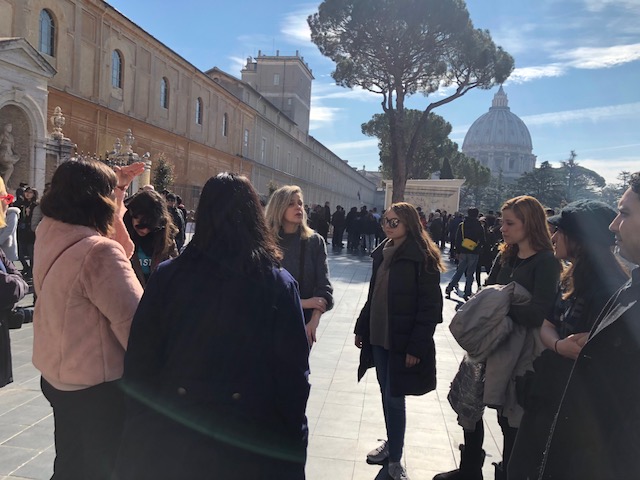 ANT 4853 Archaeology Across the Atlantic. The archaeological past is alive in Urbino. With its Roman beginnings, Medieval walls, and Renaissance town center, the distant past is intertwined with the modern world. As we appreciate Urbino, we will take a wide view by considering some of the major trends in the archaeological story on both sides of the Atlantic. This course will compare dramatic archaeological developments in Europe with those of the New World. Some topics include hunter-gatherer lifeways, the spread of farming, the emergence of hierarchical societies, warfare, and collapse. Comparisons will also include archaeological techniques such as the study of human remains, dating, and the role of history and ethnography.
ANT 4853 Archaeology Across the Atlantic. The archaeological past is alive in Urbino. With its Roman beginnings, Medieval walls, and Renaissance town center, the distant past is intertwined with the modern world. As we appreciate Urbino, we will take a wide view by considering some of the major trends in the archaeological story on both sides of the Atlantic. This course will compare dramatic archaeological developments in Europe with those of the New World. Some topics include hunter-gatherer lifeways, the spread of farming, the emergence of hierarchical societies, warfare, and collapse. Comparisons will also include archaeological techniques such as the study of human remains, dating, and the role of history and ethnography.
HIS 4953 Special Studies in History: History and Culture of Italy. This course provides students with the opportunity to acquire knowledge and understanding of Italy and the richness and diversity of its culture. The course will consist of lectures and discussions covering the following topics: Geography and geology; Italian history and its political structure; art, architecture, and design; language and literature; music and theatre; fashion design and cinema; culinary traditions and trends; popular traditions including sports, daily life and social customs.
FL 1034 Beginning Language Study Abroad. Opportunity to begin developing oral and written communication skills in the target language, along with enhanced comprehension skills in listening and reading. Linguistic and cultural immersion. May be repeated up to 8 semester credit hours in each language.
Fall 2024 Faculty
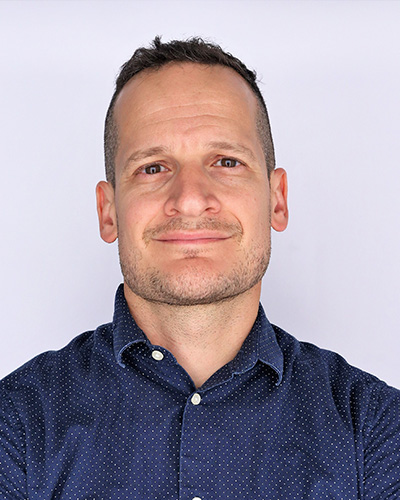 Dr. Luca Pozzi is an Associate Professor in the Department of Anthropology at UTSA. He holds a Ph.D. in Biological Anthropology from New York University (2013), and M.S. in Animal Conservation and Biodiversity (2006) and a B.S. in Biology (2003) from the Università degli Studi in Torino, Italy. Dr. Pozzi’s work focuses on primate biodiversity and conservation, including the study of the driving factors that shape diversification in time and space, and how primates respond to human-induced environmental and climatic change. He has published in several high-ranked journals in the field of biological anthropology ( American Journal of Primatology and Evolutionary Anthropology), evolutionary biology ( Journal of Biogeography and Molecular Evolution and Phylogenetics), and science more broadly ( Science Advances). He has received funding from the National Science Foundation for his work on historical collections. He is a member of the UTSA Academy of Distinguished Teaching Scholars and he is the receiver of multiple teaching awards, including the 2021 Regents’ Outstanding Teaching Award, the most prestigious teaching award in the UT system. Most of his courses are rooted in the relevant debates in biological anthropology - from understanding human diversity in connection to race, to the evolution of sex and human sexuality, to primate conservation and the challenges we face in light of climate change.
Dr. Luca Pozzi is an Associate Professor in the Department of Anthropology at UTSA. He holds a Ph.D. in Biological Anthropology from New York University (2013), and M.S. in Animal Conservation and Biodiversity (2006) and a B.S. in Biology (2003) from the Università degli Studi in Torino, Italy. Dr. Pozzi’s work focuses on primate biodiversity and conservation, including the study of the driving factors that shape diversification in time and space, and how primates respond to human-induced environmental and climatic change. He has published in several high-ranked journals in the field of biological anthropology ( American Journal of Primatology and Evolutionary Anthropology), evolutionary biology ( Journal of Biogeography and Molecular Evolution and Phylogenetics), and science more broadly ( Science Advances). He has received funding from the National Science Foundation for his work on historical collections. He is a member of the UTSA Academy of Distinguished Teaching Scholars and he is the receiver of multiple teaching awards, including the 2021 Regents’ Outstanding Teaching Award, the most prestigious teaching award in the UT system. Most of his courses are rooted in the relevant debates in biological anthropology - from understanding human diversity in connection to race, to the evolution of sex and human sexuality, to primate conservation and the challenges we face in light of climate change.
 Dr. Robert Hard is an archaeologist with a focus on hunters and gatherers and the emergence of farming, particularly in the American Southwest and Northwest Mexico. He has led multiple archaeological projects in the region and enjoys working with students in the field and classroom. His Ph.D. and M.A are in Anthropology from the University of New Mexico and his B.A. in Anthropology is from the University of Arizona. He has published a book from the University of Utah Press and his journal publications include articles in Science, Proceedings of the National Academy of Science, American Antiquity, PLOS One, The Holocene, and American Anthropologist among others. He is a member of UTSA’s Academy of Distinguished Researchers and a recipient of the Richard S. Howe Excellence in Undergraduate Teaching Award and the President’s Distinguished Achievement Award for Research.
Dr. Robert Hard is an archaeologist with a focus on hunters and gatherers and the emergence of farming, particularly in the American Southwest and Northwest Mexico. He has led multiple archaeological projects in the region and enjoys working with students in the field and classroom. His Ph.D. and M.A are in Anthropology from the University of New Mexico and his B.A. in Anthropology is from the University of Arizona. He has published a book from the University of Utah Press and his journal publications include articles in Science, Proceedings of the National Academy of Science, American Antiquity, PLOS One, The Holocene, and American Anthropologist among others. He is a member of UTSA’s Academy of Distinguished Researchers and a recipient of the Richard S. Howe Excellence in Undergraduate Teaching Award and the President’s Distinguished Achievement Award for Research.
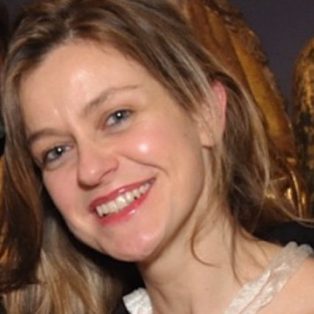 Dr. Grazia Fachechi is an Assistant Professor of Art History at the University of Urbino, Department of Humanities, where she has taught undergraduate and graduate students for more than twenty years. She received her Bachelor and Master degrees in Urbino and did post-graduate work in other cities: Florence (certificate in Museology and Art Criticism at the International University of Art – UIA), Perugia (PhD in Art History at the University of Perugia) and Rome (Diploma of Specialization in Medieval and Modern Art History at Sapienza University). She currently lives in Rome.
Dr. Grazia Fachechi is an Assistant Professor of Art History at the University of Urbino, Department of Humanities, where she has taught undergraduate and graduate students for more than twenty years. She received her Bachelor and Master degrees in Urbino and did post-graduate work in other cities: Florence (certificate in Museology and Art Criticism at the International University of Art – UIA), Perugia (PhD in Art History at the University of Perugia) and Rome (Diploma of Specialization in Medieval and Modern Art History at Sapienza University). She currently lives in Rome.
Dr. Fachechi’s principal fields of expertise are illuminated manuscripts (specifically works preserved in the Vatican Library) and wooden sculptures. She is the author of a book on Jacopo da Fabriano who was one of the favorite miniaturists of the Renaissance Pope Pius II and two books on wooden sculptures. The most recent is a catalogue of the most important wooden sculpture collection in Italy (housed in the National Museum of Palazzo Venezia in Rome) and was funded by the Getty Foundation of Los Angeles.
She has also published research on paintings, both from the Medieval and Renaissance ages. She is very interested in the text-image relationship, both in the religious context, with special regard to the iconography of the Passion of Christ, and in the lay context, with particular interest in iconographical themes of Classical Antiquity and the visual illustration of ancient literary works (especially those by the Latin writers Plauto and Seneca) in the Medieval and Renaissance eras.
 The Italian language courses are taught by certified instructors at Lingua Ideale Urbino working under the auspices of the University of Urbino “Carlo Bo”. Lingua Ideale is a professional language school offering courses of Italian language and culture to foreigners. The curriculum for the COLFA Semester in Urbino has been designed to meet the requirements of the foreign language courses at UTSA while also incorporating local aspects of Italian culture.
The Italian language courses are taught by certified instructors at Lingua Ideale Urbino working under the auspices of the University of Urbino “Carlo Bo”. Lingua Ideale is a professional language school offering courses of Italian language and culture to foreigners. The curriculum for the COLFA Semester in Urbino has been designed to meet the requirements of the foreign language courses at UTSA while also incorporating local aspects of Italian culture.

